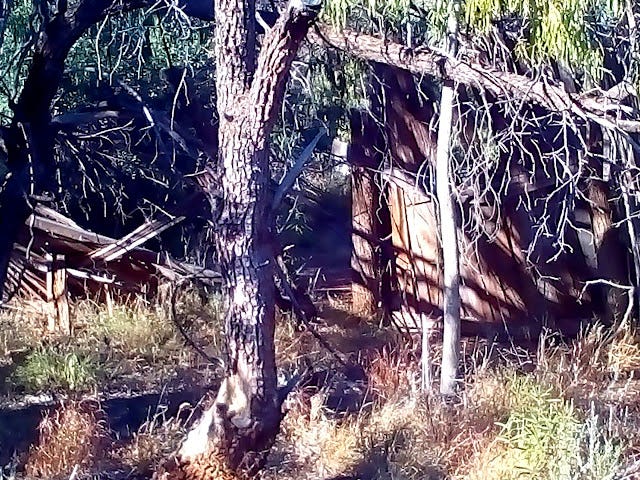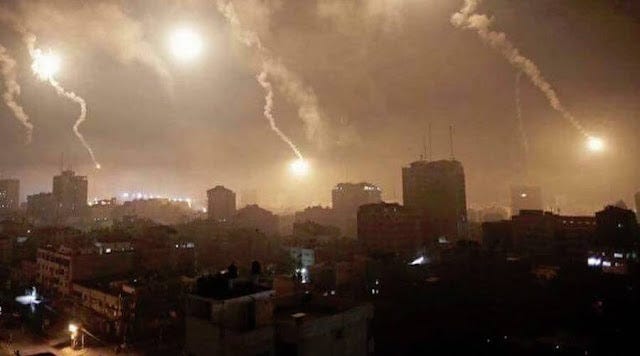
"It was a smash and grab", he heard in the dreams of one of the neighbouring policemen, who thought so much about work it wasn't funny, from the forms in the office to the theatre of the street. Highly motivated.
"You have to remember, there are some good people."
There was, in that strange time, a sustained sense of loss.
"It's been an honour to serve," he heard one of the Watchers on the Watch say.
Some of them, military, had talked or thought long and hard about their experiences in Afghanistan, where Australia was now sending hundreds of soldiers back into that futile conflict, Australia's longest war. And Iraq, where Australia was already heavily involved, and morally disgraced. Mostly from the point of view of young, excited men, on the adventure of a lifetime.
And with numerous tales about the waste, the utter pointlessness of it all. The perfidy, the madness of the politicians, the bureaucrats and most of all their bosses, all of whom contrived to send them to the front line.
All of whom were happy to put other people not their own onto the battlefield.
The fodder of the peasant class.
They talked, as no one but a soldier talks, of the futility of it all, the futility of war.
How much the locals hated them, along with their American "allies". How dangerously strange it all was.
How, in the Middle East, there were no good actors.
Australia shouldn't be there.
To justify it the government had peddled lies to the Australian people about "liberating the Iraqi people" and making the country safer by stamping out "the death cult" at its roots.
It was all baloney.
Everyone knew. No one could stop it.
The machinery was in place.
Only two things are infinite, the universe and human stupidity, and I'm not sure about the former.” Attributed to Albert Einstein
Every day, the freedoms of Australians grew less.
The government more totalitarian.
The standard of living slipped. For a population on the edge of poverty was more malleable.
"Blinkered, we've all had blinkers on."
There were larger things at play. He had insisted. They had ignored.
Easier to paint the different as the mad.
So he told one story, wrote another.
It wasn't the first time Old Alex had been forced to use diversionary tactics.
It was puerile, so much of what had happened to him courtesy of the Watchers on the Watch. And thereby courtesy of the government.
But he was just a cipher, not the subject of the story.
That would be the times.
It was winter, the sun cold, the days short.
There was an extreme disconnect between the people and their government.
In Mosul, the final yards, the final mopping up operations were being completed.
The Prime Minister had arrived in the pummeled city and announced victory. He was announcing victory over a pile of rubble.
According to reports, thousands of bodies still lay rotting in the ruins.
Who they were, why they were, how they came to be martyrs, how they and their children came to be fighting and dying for Allah, all of it would be lost in the chaos of war.
There was no plan for victory.
As the soldiers of the notorious Iraqi Army danced in the street, Islamic State was fully exploiting the propaganda benefits of defeat.
There was a sickening thud, as if an explosion had just gone off but the shock wave was yet to arrive.
A major report released earlier in the year, based on documents declassified only after extensive Freedom of Information pursuit forced the hand of the Defence Department, demonstrated clearly, after an extensive, forensic investigation by a government insider, that Australia went to war in Iraq in 2003 not for the reasons peddled to the public, liberation of the people of Iraq, but for one simple reason, cosying up to the American alliance.
With all those tens of billions of dollars of military contracts.
And all that intelligence sharing from the Five Eyes agreement.
For Australia had always spied extensively on its own citizens, even more than other Western countries, and the caches of information about their own were welcome.
For what it was worth.
It was most certainly not worth the collapse of sovereignty which accompanied it.
The dense manipulation of the public mind.
The deliberate promulgation of ignorance.
The deliberate softening up of the nation's mental state, bread and circus, the dross of My Kitchen Rules and House Rules at the forefront of the news list.
We sacrificed ourselves, our nation, for what?
And what would the future reveal about the compromises, the concealment, the hypocrisies and lies of 2017?
That the government knew its bombs, the bombs paid for by Australian taxpayers, were causing extensive civilian casualties? That hundreds had died needlessly? That America's cavalier attitude to collateral damage had infested our own Defence Force operations?
That they knew, and did nothing?
That the war, the reducing of Mosul to rubble, was a pointless, potentially globally destabilising event?
That the propagandists inside the government had deliberately concealed the truth from the public?
That at the most senior levels of government, including the political, the wellsprings of advice coming forth from some of the country's most senior analysts, go back, you are going the wrong way, the war is misguided, Australia's involvement is counter productive and will further radicalise the Muslim minority, thereby making the entire country far less safe at the same time as damaging the country's moral standing in the world, that all of the reports, the advice, the commonsense, the fault lines of complicity , trails of evidence leading to criminal culpability and breaches of international humanitarian law was being ignored?
That they were culpable, and therefore the country as a whole was culpable, through deliberate blindness? The promulgation of ignorance?
That specific reports warning of dire consequence had been cavalierly passed over, binned as quickly and as secretively as possible?
For no one must no the truth? Or find the trail of the crime?
In an era where the legislation was so confoundingly tight it was almost impossible to become a whistle blower, no matter how noble the intent, how damming the evidence?
That they struggled mightily to determine how best to pass the information into the public arena?
Only to discover the nation's own internal battlefield, a mediascape so degraded that to run such stories, even if the stories could be dodged past lawyers and oppressive layers of legislation, was impossible, for no media outlet had the gumption to run with it?
But while the broader world grew harsher, for Old Alex, marooned in his own little cocoon of time, the social landscape softened.
"He's not so bad. You just have to get used to him."
The assessment of the local authorities of Old Alex had changed, and with it the level of harassment aka surveillance he had endured died off.
Intercession of a kind heart. "You'll have me to deal with."
Everything had been a reflection. For a time they knew he knew, but nothing stopped them. And then a kind of peace, at least in that regard, settled in this little beachside pond. A remote and ordinary place where people went about their daily lives quietly. Did their shifts. Met up with their mates. Watched football. Went home. Raised children. Tried to do the right thing.
Even the members of the Universal Church had backed off.
Because in the spooky inconvenience of the era, there were wider stories stalking the land.
Greater repressions. Greater expressions of intent by darker forces.
Of impending brutality.
"If you want a vision of the future, imagine a boot stamping on a human face - forever." Orwell.
Except this was an Ugg boot stamping down onto already muffled consciousness.
Eyes crushed flowers, rimmed with black.
THE BIGGER STORY:
https://www.theguardian.com/world/2017/jul/09/iraq-announces-victory-over-islamic-state-mosul

Iraq’s prime minister has arrived in Mosul and declared “victory” over Islamic State after eight months of fighting, bringing an end to three years of jihadi rule in the northern city.
The battle has left large parts of Mosul in ruins, killed thousands of civilians and displaced nearly one million people.
“The commander in chief of the armed forces [the prime minister] Haider al-Abadi arrived in the liberated city of Mosul and congratulated the heroic fighters and Iraqi people for the great victory,” his office said in a statement on Sunday.

The announcement came despite reports that heavy fighting continued in the last Isis strongholds in the city.
Bodies of militants lay in the narrow streets of the old city where Islamic State staged a last stand against Iraqi forces backed by a US-led coalition.
The group vowed to fight to the death in Mosul, but Iraqi military spokesman Brig Gen Yahya Rasool told state TV 30 militants had been killed attempting to escape by swimming across the Tigris river that bisects the city.
The cornered militants resorted to sending female suicide bombers out among the thousands of civilians who are emerging from the battlefield wounded, malnourished and fearful.
The battle has also exacted a heavy toll on Iraq’s security forces. The Iraqi government does not reveal casualty figures, but a funding request from the US Department of Defense (DoD) said the elite counter-terrorism service, which has spearheaded the fight in Mosul, had suffered 40% losses.
The US leads an international coalition backing the campaign against Isis by conducting airstrikes against the militants and assisting troops on the ground. DoD has requested $1.27bn (£1bn) in next year’s budget to continue supporting Iraqi forces.
Without Mosul – by far the largest city to have fallen under militant control – Islamic State’s dominion in Iraq will be reduced to mainly rural, desert areas west and south of the city where tens of thousands of people live.

It is almost exactly three years since the ultra-hardline group’s leader, Abu Bakr al-Baghdadi, proclaimed a caliphate spanning Syria and Iraq from the pulpit of the medieval Grand al-Nuri mosque.
Abadi declared the end of Islamic State’s “state of falsehood” a week ago, after security forces retook the mosque – although only after retreating militants blew it up.

The United Nations predicts it will cost more than $1bn to repair basic infrastructure in Mosul. In some of the worst affected areas, almost no buildings appear to have escaped damage and Mosul’s dense construction means the extent of the devastation might be underestimated, UN officials said.
The militants are expected to revert to insurgent tactics as they lose territory. The fall of Mosul also exposes ethnic and sectarian fractures between Arabs and Kurds over disputed territories or between Sunnis and the Shia majority that have plagued Iraq for more than a decade.




